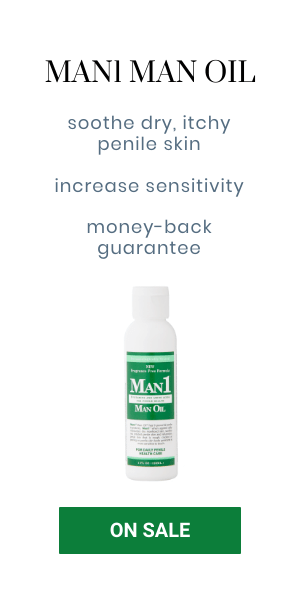The member is a complex and wondrous thing, so it’s no wonder it inspires much pondering and even more questions about its how’s and why’s. Add that to the Information Age and no limit to the content that a man can Google. However, where can a man turn to answer those delicate questions and come away with truthful, informative answers? Here’s a hint, it’s right here. Read on about seven important questions men ask about male organ health and how to have the healthiest member possible.
Male Organ Health Question #1: Is circumcision good or bad?
There are up and downsides to circumcision. Many men don’t get to make a choice for themselves as parents opt for circumcision immediately after birth. Let’s talk about the drawbacks of each. Uncircumcised members are more prone to smegma, phimosis, and paraphimosis and tend to be a touch more sensitive than their hoodless counterparts. Circumcised men are more likely to experience irritation and chafing and are more susceptible to STIs. Whether cut or uncut, two things are constant: 1. Always practice safe intimate relations, and 2. Clean the member thoroughly and daily to avoid smegma and balanitis.
Male Organ Health Question #2: Is it normal for pee to be different colors?
There are some perfectly normal reasons for urine to be something other than a light yellow. Sometimes it will take on the color of what a man eats, especially reds and greens. Other times, urine can inform a man about things that are going on in his body. Clear urine can indicate a man is overhydrated whereas orange or brown suggests the opposite. Bloody, blue, cloudy, or green urine can be a sign of an infection or internal health issue. See a doctor if concerned.
Male Organ Health Question #3: Does a normal member have a bend or curve to it?
A slight curve or bend is entirely normal. However, if a man has a significant bend that’s causing pain, it could be a sign of Peyronie’s disease. This happens when scar tissue builds up in the member, causing it to curve to one side. Scar tissue can be the result of a major genital trauma or repeated smaller injuries. If the bend is too much, see a urologist or primary care physician ASAP.
Male Organ Health Question #4: What is the right amount of fluid for release?
There’s no real “
perfect” amount, but if a man is noticing he’s producing less than he used to, he could be suffering from PEVR. PEVR can be caused by diabetes, depression, medication, and testicular conditions. See a health professional if PEVR is suspected.
Male Organ Health Question #5: Can a man break his member?
Actually, yes, but it is most often called a member fracture because the member doesn’t have a bone per se. Member fractures happen when the inner lining of the member is torn. This is commonly caused by rough intimate relations. Symptoms of a genital fracture include a blue or black hue, flattening, and a popping noise at the time of fracture. Head to the ER immediately because a genital fracture is a severe medical emergency.
Male Organ Health Question #6: What’s going on when a man’s peeing more than usual?
Frequent urination could be an indicator of a few things such as diabetes, a urinary tract infection, and something called interstitial cystitis, which is an inflammation of the bladder muscles. If it’s often happening or if there’s burning accompanying the excessive urination, see a doctor as soon as possible.
Male Organ Health Question #7: Is it true if a man doesn’t use it, he’s going to lose it?
Well, yes and no. There’s no clinical evidence that a man will lose his hard-on forever if he hasn’t had intimate sensual contact with himself or a partner in a while. However, he may find his drive has declined, and he has a higher chance of member dysfunction. Like any muscle, the member needs a workout. The more a man works it out (safely, of course), the more powerful it can be. Of course, if a man is getting regular “workouts” for his love muscle, he should add a quality male organ health creme (health professionals recommend Man 1 Man Oil, which has been clinically proven safe and mild for skin) every day. He needs a crème that is specifically created for delicate, genital skin, and one that provides all the critical nutrients the member needs to encourage rejuvenation and soft, elastic skin while boosting blood flow and vigor. There’s no question about it!
